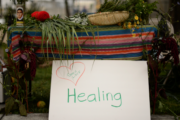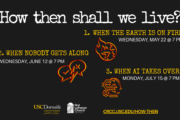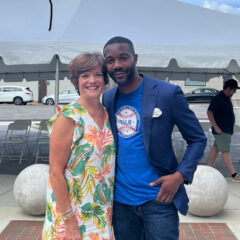With the passage of welfare reform in 1996, the United States government instituted the “Charitable Choice” provision, leading to, for the first time, direct funding of religious organizations to provide social services. The USC Center for Religion and Civic Culture is hosting a series of discussions about the 20th anniversary of Charitable Choice, as well as the future of relationship between government and religious communities. As a part of this discussion, CRCC developed an extensive bibliography that can be used as a resource for future research into Charitable Choice.
Bibliography
Advisory Council, White House Office of Faith-based and Neighborhood Partnerships, (Washington, D.C., 2010). “A New Era of Partnerships,” report of recommendations to the President. http://www.whitehouse.gov/sites/default/files/microsites/ofbnp-council-final-report.pdf (accessed 22 May 2016).
Barack, Obama (2009). “Transcript: A New Beginning,” Cairo, Egypt. http://www.washingtonpost.com/wp-dyn/content/article/2009/06/04/AR2009060401117.html (accessed 22 May 2016).
Center for Urban Policy and the Environment (2003). Charitable choice: First results from three states.
Christian Science Monitor (2009). “Obama’s faith in faith-based works: His new office of faith-based initiatives still leaves unresolved a key church-state issue,” 6 February. http://www.csmonitor.com/Commentary/the-monitors-view/2009/0206/p08s04-comv.html.
“President Obama Recognizes Hindu American Seva,” http://www.odysseynetworks.org/news/2011/10/31/president-obama-recognizes-hindu-american-seva (accessed 22 May 2016).
Storrar, William. “Special Issue— Faith-Based Organizing in the USA,” International Journal of Public Theology, 6, 377-381 (2012). DOI:http://dx.doi.org/10.1163/15697320-12341261.
Bartkowski, J. P., & Regis, H. A. (2012). Religious Organizations, Anti-Poverty Relief and Charitable Choice: A Feasibility Study of Faith-Based Welfare Reform in Mississippi. Arlington, VA: PricewaterhouseCoopers, Endowment for, the Business of Government.
Becker, Diane, Gittelsohn, Joel, Koffman, Dyann, Moy, Taryn, Yanek, Lisa (2001). “Project Joy: Faith Based Cardiovascular Health Promotion for African American Women,” Public Health Reports, 1: 116, 68 – 81.
Belk, William (2006). Of Little Faith: The Politics of George W. Bush’s Faith-Based Initiatives (review),” Rhetoric & Public Affairs, Volume 9, Number 2, Summer, pp. 312-316. http://muse.jhu.edu/article/203652.
Bernstein, E. (2010). “Militarized Humanitarianism Meets Carceral Feminism: The Politics of Sex, Rights, and Freedom in Contemporary Antitrafficking Campaigns,” Signs, 36(1), 45-71. http://doi.org.libproxy2.usc.edu/10.1086/652918.
Brownstein, A. E. (1999). “Interpreting the Religion Clauses in Terms of Liberty, Equality, and Free Speech Values-A Critical Analysis of Neutrality Theory and Charitable Choice,” Notre Dame JL Ethics & Pub. Pol’y, 13, 243.
Campbell, D. (2002). “Beyond charitable choice: The diverse service delivery approaches of local faith-related organizations,” Nonprofit and Voluntary Sector Quarterly, 31(2), 207-230.
Carlson-Thies, S. (2001). “Charitable choice: Bringing religion back into American welfare,” Journal of Policy History, 13(01), 109-132.
Chaves, M. (1999). “Religious congregations and welfare reform: Who will take advantage of ‘charitable choice’?” American Sociological Review, 836-846.
Chaves Mark & William Tsitsos (2001). “Congregations and Social Services: What They Do, How They Do It, and with Whom,” Nonprofit and Voluntary Sector Quarterly 30/1, 660–682.
Clerkin, Richard M. & Grønbjerg, K. A. (2007). “The Capacities and Challenges of Faith-Based Human Service Organizations,” Public Administration Review, 67(1), 115–126. Retrieved from http://www.jstor.org.libproxy2.usc.edu/stable/4624545.
Cnaan, R. A., & Boddie, S. C. (2002). “Charitable choice and faith-based welfare: A call for social work,” Social Work, 47(3), 224-235.
Dachner, Naomi, Stephen Gaetz, Blake Poland, and Valerie Tarasuk (2009). “An Ethnographic Study of Meal Programs for Homeless and Under-Housed Individuals in Toronto,” Journal of Health Care for the Poor and Underserved, Volume 20, Number 3, August pp. 846-853. http://muse.jhu.edu.libproxy2.usc.edu/article/270024.
Daly, L. (2009). “Why ‘faith-based’ is here to stay.” Policy Review, (157), 31-46. Retrieved from http://libproxy.usc.edu/login?url=http://search.proquest.com.libproxy1.usc.edu/docview/216457231?accountid=14749.
DeHaven, M. J., Hunter, I. B., Wilder, L., Walton, J. W., & Berry, J. (2004). “Health programs in faith-based organizations: Are they effective?” American Journal of Public Health, 94, 1030-1036
DeWeese-Boyd, Margie (2004). “Reestablishing Poor Law as Public Ethic: Church, Charity, and Poverty Alleviation in the Post-Welfare Era,” Journal of Policy History, Volume 16, Number 4, pp. 352-358. http://muse.jhu.edu.libproxy2.usc.edu/article/174121.
Dibadj, M. (2001). “Legal and Social Consequences of Faith-Based Initiatives and Charitable Choice,” The S. Ill. ULJ, 26, 529.
Dilulio, J.J. (2002). “The Three Faith Factors,” Public Interest, 149 (Fall), 50 – 64.
Sider, R.J. & Unruh, H.R. (1999). “No Aid to Religion? Charitable Choice and the First Amendment,” Brookings Review, 17(2), 46 – 49.
DiIulio, J. J. (2000). “Godly people in the public square. Review,” The Public Interest, 141.
Federal Register (2002). Charitable Choice Provisions Applicable to Programs Authorized Under the Community Services Block Grant Act; Proposed Rule. 45 CFR Part 1050. Tuesday, December 17. 77368-77371.
DuBois, Joshua (2009). “A Vision for Faith-Based and Neighborhood Partnerships,” speech to the Brookings Institution, Washington, D.C.: http://www.whitehouse.gov/blog/2010/02/18/a-vision-faith-based-and-neighborhood-partnerships (accessed 22 May 2016).
Ebaugh, Helen, Fuchs, Rose, Saltzman Chafetz, Janet, and Pipes, Paula F. (2006). “Where’s the Faith in Faith-based Organizations? Measures and Correlates of Religiosity in Faith-based Social Service Coalitions,” Social Forces, Volume 84, Number 4, June, pp. 2259-2272. http://muse.jhu.edu.libproxy2.usc.edu/article/200977.
Esbeck, C. H. (2000). “Charitable Choice and the Critics,” NYU Ann. Surv. Am. L., 57, 17.
Ferguson, Kristin M., Qiaobing Wu, Donna Spruijt-Metz and Grace Dyrness (2007). “Outcomes Evaluation in Faith-Based Social Services: Are We Evaluating Faith Accurately?” Research on Social Work Practice, 17; 264.
Fischer, Robert (2003). “The Devil is in the Details: Implementing Outcome Measurement in Faith-Based Organizations,” Paper Presentation, Bethesda, MD, March 6 -7.
Flory, R., Farrag, H., Loskota, B., Belzer, T. (2012). “Faith-Based Human Services: The Current State of Outcomes Assessment,” in Edward J. Mullen and Jennifer L. Magnabosco, eds., Outcomes Measurement in the Human Services: Cross-Cutting Issues and Methods (2nd Edition) (Washington, DC: NASW Press). https://crcc.usc.edu/outcomes-measurement-in-the-human-services-cross-cutting-issues-and-methods.
Francis, S. A., & Liverpool, J. (2009). “A Review of Faith-Based HIV Prevention Programs,” Journal of Religion and Health, 48, 6-15.
Geller Ari & Samantha Friedman, “Coalition Against Religious Discrimination,” letter to President Obama from the Interfaith Alliance. http://www.interfaithalliance.org/news/349-coalition-against-religious-discrimination-letter-to-president-obama (accessed 27 December 2012).
Glenn, C. L. (2015). “Faith-based resistance,” First Things, (258), 17-18. Retrieved from http://libproxy.usc.edu/login?url=http://search.proquest.com.libproxy1.usc.edu/docview/1735314159?accountid=14749.
Glennon, F. (2000). “Blessed Be the Ties That Bind? The Challenge of Charitable Choice to Moral Obligation,” Journal of Church and State, 42(4), 825–843. Retrieved from http://www.jstor.org.libproxy2.usc.edu/stable/23920197.
Gill, E. R. (2004). “Religious organizations, charitable choice, and the limits of freedom of conscience,” Perspectives on Politics, 2(04), 741-755.
Gilman, M. E. (2002). “Charitable choice and the accountability challenge: reconciling the need for regulation with the first amendment religion clauses,” Vand. L. Rev., 55, 799.
Gilman, M. E. (2007). “If at First You Don’t Succeed, Sign an Executive Order: President Bush and the Expansion of Charitable Choice,” William & Mary Bill of Rights, 15(4).
Gilman, M. E. (2007). “Fighting poverty with faith: Reflections on ten years of Charitable Choice,” Journal of Gender, Race and Justice, 10(3).
Goldenziel, J. (2005). “Blaine’s Name in Vain: State Constitutions, School Choice, and Charitable Choice,” Denv. UL Rev., 83, 57.
Good, Josh (2013). “Assessing Four Years of Obama;s Faith-Based Initiatives,” National Review, February 8. http://www.nationalreview.com/corner/340229/assessing-four-years-obamas-faith-based-initiatives-josh-good.
Green, S. K. (2000). “Charitable Choice and Neutrality Theory,” NYU Ann. Surv. Am. L., 57, 33.
Green John C. & Sherman Amy L., “ Fruitful Collaborations: A Survey of Government-Funded Faith-Based Programs in 15 States,” press conference co-sponsored by the Hudson Institute and the Center for Public Justice at the National Press Club (Charlottesville: 2002).
Hill, Jonathan P. Vaidyanathan, Brandon (2011). “Substitution or Symbiosis? Assessing the Relationship between Religious and Secular Giving,” Social Forces, Volume 90, Number 1, September, pp. 157-180. http://muse.jhu.edu.libproxy2.usc.edu/article/464020.
Jakobsen, J. R., & Alpert, R. T. (2002). “Faith Based on What? A Roundtable Discussion,” Journal of the American Academy of Religion, 70(4), 821–832. Retrieved from http://www.jstor.org.libproxy2.usc.edu/stable/1466402.
Johnson, F. E. (1941). “Protestant social work,” in R. H. Kurtz (Ed.) Social work year book (pp. 403-412). New York: Russell Sage Foundation.
Kennedy, S. S., & Bielefeld, W. (2002). “Government shekels without government shackles? The administrative challenges of Charitable Choice,” Public Administration Review, 62(1), 4-11.
Kennedy, S. S. (2003). “Privatization and prayer the challenge of Charitable Choice,” The American Review of Public Administration, 33(1), 5-19.
Kennedy, S. S., & Bielefeld, W. (2003). Charitable choice: First results from three states. Indianapolis, IN: Center for Urban Policy and the Environment.
Kennedy, S. S., & Bielefeld, W. (2006). Charitable choice at work: Evaluating faith-based job programs in the states. Georgetown University Press.
Kramer, F. D. (2010). “The role for public funding of faith-based organizations delivering behavioral health services: Guideposts for monitoring and evaluation.” American Journal of Community Psychology, 46(3-4), 342-60. doi: http://dx.doi.org.libproxy1.usc.edu/10.1007/s10464-010-9351-8
Lampkin, L., & Raghavan, K. (2008). “Organizational Characteristics, Financial Performance Measures, and Funding Sources Of Faith Based Organizations,” Journal of Health and Human Services Administration, 31(3), 332–355. Retrieved from http://www.jstor.org.libproxy2.usc.edu/stable/41288093.
Lane, Jodi (2009). “Faith-Based Programming for Offenders,” Victims & Offenders: An International Journal of Evidence-based Research, Policy and Practice, Vol. 4, Issue 4.
Leake, R., Green, S., Marquez, C., Vanderburg, J., Guillaume, S., & Gardner, V. (2007). Evaluating the Capacity of Faith-Based Programs in Colorado. Research on Social Work Practice, 17(2), 216-228.
Levin, Jeff (2014). “Faith-Based Partnerships for Population Health: Challenges, Initiatives, and Prospects,” Public Health Rep. 2014 Mar-Apr; 129(2): 127–131.
Mutterperl, L. B. (2002). “Employment at (God’s) Will: The Constitutionality of Antidiscrimination Exemptions in Charitable Choice Legislation.” Harv. CR-CLL Rev., 37, 389.
Nagel, A.-K. (2006). “Charitable Choice: The Religious Component of the US-Welfare-Reform: Theoretical and Methodological Reflections on ‘Faith-Based-Organizations’ as Social Service Agencies,” Numen, 53(1), 78–111. Retrieved from http://www.jstor.org.libproxy2.usc.edu/stable/27643200
Nagel, A-K (2013). “Agents, Armies, Allies: Semantics of Public-Private Partnerships in US Welfare Reform,” Journal of Religion in Europe, Volume 6, Issue 2, pages 175 – 200. http://booksandjournals.brillonline.com/content/journals/10.1163/18748929-00602003.
Owens, M. L. (2006). “Which Congregations Will Take Advantage of Charitable Choice? Explaining the Pursuit of Public Funding by Congregations,” Social Science Quarterly, 87(1), 55-75.
Persons, G. A. (2004). “National politics and charitable choice as urban policy for community development,” The ANNALS of the American Academy of Political and Social Science, 594(1), 65-78.
Persons, G. A. (2011). “How firm a foundation? Comparing the Bush and Obama faith-based initiatives,” Forum on Public Policy: A Journal of the Oxford Round Table. http://go.galegroup.com.libproxy2.usc.edu/ps/i.do?id=GALE%7CA317588317&sid=summon&v=2.1&u=usocal_main&it=r&p=AONE&sw=w&asid=5b93792f621806ddb56e851a3fdd4781
Pipes, P. F., & Ebaugh, H. R. (2002). “Faith-Based Coalitions, Social Services, and Government Funding,” Sociology of Religion, 63(1), 49–68. Retrieved from http://www.jstor.org.libproxy2.usc.edu/stable/3712539
Pilbeam, B. (2010). “The Tragedy of Compassionate Conservatism,” Journal of American Studies, 44(2), 251–268. Retrieved from http://www.jstor.org.libproxy2.usc.edu/stable/40648813
Pritchard, E. A. (2003). “Speaking out: Faith-Based Patriarchy and the Rhetoric of ‘Choice,'” Journal of Feminist Studies in Religion, 19(1), 65–70. Retrieved from http://www.jstor.org.libproxy2.usc.edu/stable/25002459.
Putnam, R. (2000). Bowling alone. NY: Simon & Schuster.
Regnerus, Mark (2003). “Charitable Choices: Religion, Race, and Poverty in the Post-Welfare Era (review),” Social Forces, Volume 82, Number 2, December, pp. 861-863. http://muse.jhu.edu.libproxy2.usc.edu/article/51134.
Roman, Caterina G, Wolff, Ashley, Correa, Vanessa, and Buck, Janeen (2007). “Assessing Intermediate Outcomes of a Faith-Based Residential Prisoner Reentry Program,” Research on Social Work Practice, 17; 199- 215.
Sager, Rebecca (2007). “The Cultural Construction of State Sponsored Religion: Race, Politics, and State Implementation of the Faith-Based Initiative,” Journal of Church and State, 49(3), 467–485. Retrieved from http://www.jstor.org.libproxy2.usc.edu/stable/23921515
Saperstein, D. (2003). “Public Accountability and Faith-Based Organizations: A Problem Best Avoided,” Harvard Law Review, 116(5), 1353–1396. http://doi.org.libproxy2.usc.edu/10.2307/1342729
Semuels, Alana (2016). “When Religious Groups Do What the Government Won’t,” The Atlantic, April 8, http://www.theatlantic.com/business/archive/2016/04/religious-groups-government-arkansas/477366/
Sider, R. J., & Unruh, H. R. (1999). “‘N⊘ Aid t⊕ Religi⊕n?’ Charitable Choice and the First Amendment,” The Brookings Review, 17(2), 46–49. http://doi.org.libproxy2.usc.edu/10.2307/20080849
Sinha, Jill Witmer (2012). “Unintended Consequence of the Faith-Based Initiative: Organizational Practices and Religious Identity Within Faith-Based Human Service Organizations,” Nonprofit and Voluntary Sector Quarterly, June, vol. 42 no. 3 563-583.
Sherman, A. L. (2000). “The growing impact of Charitable Choice: A catalogue of new collaborations between government and faith-based organizations in nine states,” Center for Public Justice.
Spoto, Peter W. (2009). “Faith-based Promising Practices: Innovative Forms of Collaborative Social Services” (Doctoral Dissertation), University of Southern California. http://digitallibrary.usc.edu/cdm/ref/collection/p15799coll127/id/284104.
Terry, J. D., Smith, A. R., Warren, P. R., Miller, M. E., McQuillin, S. D., Wolfer, T. A., & Weist, M. D. (2015). “Incorporating evidence-based practices into faith-based organization service programs,” Journal of Psychology and Theology, 43(3), 212-223. Retrieved from http://libproxy.usc.edu/login?url=http://search.proquest.com.libproxy1.usc.edu/docview/1735314761?accountid=14749
Weiss, R. P. (2001). “Charitable choice as neoliberal social welfare strategy,” Social Justice, 28(1 (83), 35-53.
Wilson, P. A. (2003). “Faith-based organizations, charitable choice, and government,” Administration & society, 35(1), 29-51.
Hebah Farrag was the assistant director of research of the USC Center for Religion and Civic Culture through 2023.





